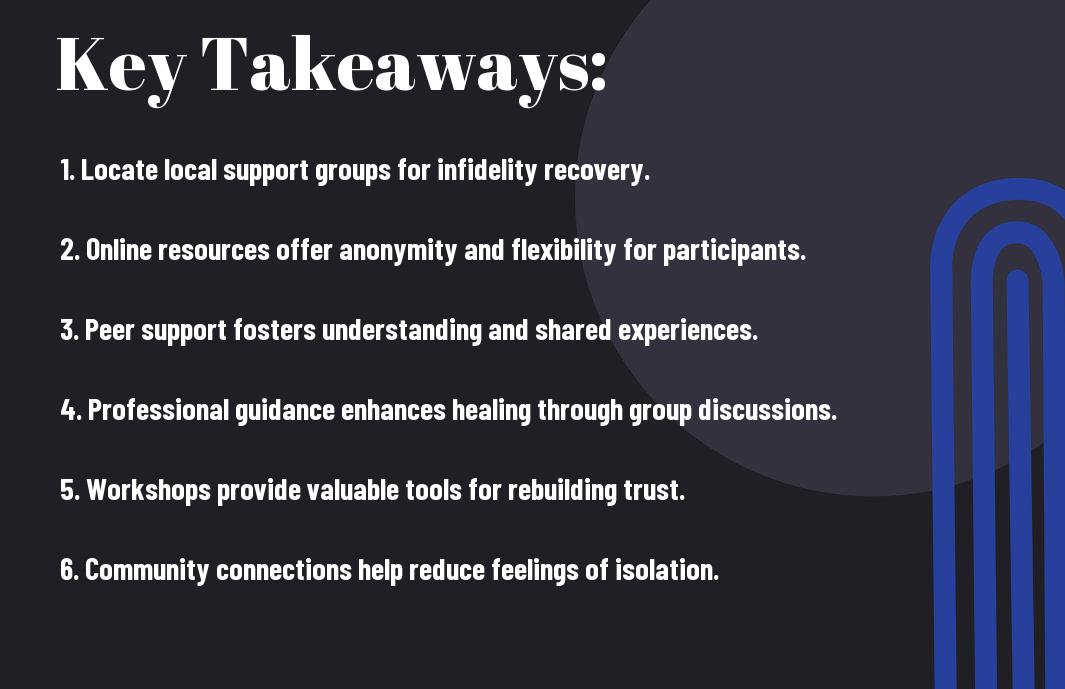There’s a path towards healing and support when dealing with the aftermath of infidelity. Understanding that you’re not alone can be a powerful step in your journey. Joining infidelity support groups allows you to connect with others who share similar experiences, providing you with a safe space to express your feelings and gain valuable insights. In this blog post, you’ll discover where to find these supportive communities, what to expect, and how they can help you navigate your emotions and restore your sense of self.
Key Takeaways:
- Infidelity support groups offer a safe space for individuals to share their experiences and feelings, facilitating emotional healing.
- These groups can provide valuable resources, including coping strategies and insights from others who have faced similar situations.
- Support can be found both in-person at community centers and online through various websites and social media platforms.
- Professionally led groups may offer structured guidance, helping participants navigate their emotions effectively.
- Connecting with others in similar situations fosters a sense of belonging and reduces feelings of isolation.
- Many support groups are free or low-cost, making them accessible to those seeking help without significant financial strain.
- It is important to choose a group that feels right for you, as the environment and focus can vary significantly between different support options.


Understanding Infidelity
For many, infidelity can feel like a devastating betrayal that shakes the foundation of a relationship. Understanding the reasons and patterns behind infidelity is crucial for healing. It can stem from various factors, including emotional disconnect or unmet needs, which highlights the complexities involved. By comprehending these dynamics, you can begin the process of addressing the issues and seeking support for yourself and your partner.
The Impact of Infidelity
On you and your partner, infidelity can have profound emotional repercussions. Feelings of anger, betrayal, and confusion are common, often leading to a breakdown in communication and trust. This trauma can affect not just the relationship but also your mental and emotional well-being, causing distress that may take time to heal. Understanding these impacts is the first step in navigating through the pain.
Types of Infidelity
To appreciate the various forms infidelity can take, it’s crucial to recognize that each type carries different implications for relationships. The following list details some common types:
- Emotional Infidelity – One partner forms a deep emotional bond with someone outside the relationship.
- Physical Infidelity – Involves sexual interaction outside of the partnership.
- Cyber Infidelity – Engaging in romantic or sexual interactions through digital means.
- Situational Infidelity – Occurs in specific circumstances, often due to impulsive decisions.
- Opportunistic Infidelity – Taking advantage of unexpected situations for cheating.
Recognizing these types can enable you to identify potential issues within your relationship and seek appropriate support.
| Type of Infidelity | Description |
|---|---|
| Emotional Infidelity | Deep emotional connection outside of the relationship. |
| Physical Infidelity | Sexual relations with someone other than your partner. |
| Cyber Infidelity | Romantic engagement via social media or online platforms. |
| Situational Infidelity | Cheating due to specific circumstances or impulsiveness. |
| Opportunistic Infidelity | Cheating when unexpected chances arise. |
A deeper understanding of the types of infidelity can empower you to recognize patterns in your relationships. It may also help you identify signs that could inform your choices moving forward. By understanding these types, you minimize the risk of repeating the past and enhance your decision-making:
- Understanding emotional needs – Helps to build stronger connections.
- Addressing communication gaps – Important for resolving underlying issues.
- Being aware of triggers – Enables you to prevent situations leading to infidelity.
- Seeking therapy – A constructive way to process feelings and rebuild trust.
- Establishing boundaries – Essential for preserving relationship integrity.
Recognizing these factors is a stepping stone toward healthier relationships and self-awareness.
The Importance of Support Groups
You may find that support groups play a vital role in your healing journey after experiencing infidelity. These environments provide a safe space where you can share your feelings, gain insights from others who have faced similar challenges, and learn coping strategies that can assist in your recovery. Connecting with others can foster a sense of belonging and alleviate the feelings of isolation that often accompany betrayal.
Emotional Benefits
Across various support groups, you can experience profound emotional benefits. Engaging in discussions about your experiences helps validate your feelings and enables you to process your pain in a constructive way. This shared understanding can empower you, allowing you to move toward healing with renewed hope and resilience.
Building Community
Across support groups, you will have the opportunity to build a community that understands the challenges you face. This network can provide you with ongoing encouragement and empowerment as you navigate your emotions and decisions following infidelity.
And as you immerse yourself in this supportive community, you’ll discover the power of connection. Sharing your experiences and hearing others’ stories can foster deep bonds, often leading to lasting friendships. This sense of belonging can be immensely comforting, reminding you that you’re not alone in your struggles. Additionally, you may find invaluable resources and guidance from fellow members that can enhance your healing process, ultimately transforming your pain into strength and support.
Finding Infidelity Support Groups
Unlike facing infidelity alone, finding a support group can provide you with the understanding and camaraderie necessary to navigate this challenging time. These groups are designed to facilitate emotional healing and connection with others who share similar experiences. Whether online or local, seeking out these resources can significantly impact your journey toward recovery and personal growth.
Online Resources
To start your search, explore online resources that offer various forms of support. Websites and social media platforms often host forums, groups, and chatrooms dedicated to discussing infidelity. These virtual spaces can provide you with comforting anonymity while allowing you to share your experiences and gain insights from others worldwide.
Local Support Groups
Groups available in your area can be invaluable for in-person support. Connecting with others face-to-face offers a sense of community and a safe space to voice your feelings. Many local organizations, like churches or community centers, may hold regular meetings focused on healing from infidelity, allowing for open dialogue and shared experiences.
For instance, local support groups often provide a more personal touch, allowing you to build relationships with others who genuinely understand your pain and struggle. These meetings create a safe environment where you can express your thoughts freely, receive emotional support, and learn from the experiences of others facing similar situations. Additionally, having a local network may also connect you to resources such as counseling services, workshops, or retreats designed to facilitate healing and recovery.
What to Expect in Support Groups
Your experience in a support group is designed to be both therapeutic and eye-opening. You will encounter individuals who share similar struggles and emotions, providing a safe haven for you to express your feelings, seek advice, and learn from others’ experiences. It’s an opportunity to hear various perspectives and find comfort in community support. Expect to develop a deeper understanding of infidelity and its impacts while fostering personal growth and healing.
Group Dynamics
On entering a support group, you will find a variety of personalities and stories, all united by the common theme of grappling with infidelity. Group dynamics often foster mutual understanding, enabling you to feel accepted and validated in your feelings. Sessions can vary in structure, from open discussions to guided topics, yet they all emphasize collective sharing of experiences and growth. You may also find that some members have been in similar situations for longer, offering you insights and encouragement.
Confidentiality and Trust
Any effective support group thrives on the principles of confidentiality and trust. You should feel secure sharing your experiences without the fear of judgment or outside exposure. These foundational elements allow members to open up about their struggles and triumphs freely. It’s necessary to establish rapport with other participants, as this enhances your sense of belonging and encourages honest dialogue. Creating a safe space ultimately paves the way for healing and connection.
Groups that prioritize confidentiality often set ground rules to protect members’ identities and stories. This commitment strengthens collective trust and encourages you to express yourself openly. It’s important to choose groups with a firm understanding of maintaining privacy while fostering trust among members. Engaging in discussions about sensitive topics can be daunting, but knowing that others respect your experiences aids in paving the road to healing and personal growth within the community.

How to Choose the Right Support Group
Once again, finding the right support group is important for your healing journey. Consider factors such as group size, facilitator experience, and your specific needs when selecting a group. Explore options like Infidelity Support Groups in New York to connect with an understanding community that resonates with your experience.
Assessing Needs
Any effective support group should address your personal circumstances, whether you seek emotional support, practical advice, or a safe space to express your feelings. Clarifying your needs beforehand will help you identify the most suitable group for your situation.
Evaluating Group Fit
Between different support groups, it’s important to evaluate how well each one aligns with your needs and comfort level. Look for a group where members share similar experiences and values, and where the facilitator promotes a safe and supportive environment. Evaluate factors like group dynamics, communication styles, and member feedback.
Another aspect to consider is the group dynamics; a supportive, positive environment can greatly influence your healing. Assess whether the group fosters open communication and encourages mutual sharing. Pay attention to how the facilitator manages discussions—do they provide guidance and respect each member’s voice? Additionally, be aware of any negativity or judgmental attitudes among participants, as these can hinder your progress. Your comfort and sense of belonging are key elements for achieving a successful support experience.
Success Stories from Support Groups
Many individuals have found solace and hope through success stories shared within support groups. These narratives often highlight the strength and resilience of people who have faced infidelity, illustrating how they not only healed but also emerged stronger in their relationships and personal lives. By listening to others’ journeys, you gain perspective, resources, and the motivation to continue your own path toward recovery.
Personal Transformations
Groups can serve as powerful catalysts for personal growth. Many participants have experienced transformative journeys, learning to prioritize their emotional well-being, redefine their relationship goals, and even rebuild trust with partners. As you engage with others who understand your struggles, you develop newfound self-awareness and strategies for healthier communication.
Lessons Learned
With every story shared, vital lessons are gleaned about trust, forgiveness, and healing. You can learn that the path to recovery isn’t linear; it’s filled with ups and downs, yet each step contributes to your overall growth.
This experience teaches you about the importance of honest communication and setting boundaries. You discover that engaging in self-reflection is key to understanding your emotions and reactions. Many have found that processing feelings in a supportive environment not only alleviates pain but also empowers them to make informed choices moving forward. Acknowledging the impact of your partner’s actions can lead to clearer insights into what you truly value in a relationship, enabling you to cultivate healthier connections in the future.
Summing up
Considering all points, seeking out infidelity support groups can provide you with the understanding and community you need during a challenging time. Whether you find these groups locally or online, they offer a safe space where you can share your experiences and emotions. Establishing connections with others who have faced similar situations can help you navigate your feelings and start the healing process. Don’t hesitate to reach out—support is available, and it can make a significant difference in your journey towards recovery.
FAQ
Q: What is an infidelity support group?
A: An infidelity support group is a space where individuals affected by infidelity—whether as the betrayer or the betrayed—can share their experiences, feelings, and strategies for coping with the emotional turmoil that often accompanies such situations. These groups aim to facilitate healing, offer emotional support, and promote understanding among participants.
Q: How can I find an infidelity support group near me?
A: You can find infidelity support groups by searching online through platforms like Meetup, Facebook Groups, or local community centers. Additionally, many therapists and counselors may have resources or recommendations for local support groups. Checking with organizations that specialize in relationship counseling can also provide valuable leads.
Q: What should I expect when attending an infidelity support group?
A: When attending an infidelity support group, you can expect a welcoming environment where participants can share their stories and feelings without judgment. Sessions may involve guided discussions led by a facilitator who ensures everyone has a chance to speak and contribute. Participants are encouraged to listen actively and support one another, fostering a sense of community and understanding.
Q: Are infidelity support groups led by professionals?
A: Not all infidelity support groups are led by professionals; some may be peer-led, where individuals with shared experiences guide the discussions. However, many groups do have trained facilitators, such as therapists or counselors, who can provide insights and strategies for healing. It’s important to verify the credentials of the group leader if you are seeking professional guidance.
Q: Is there a cost associated with joining an infidelity support group?
A: The cost of joining an infidelity support group can vary. Many groups are free and offered through community centers or nonprofit organizations, while others may charge a small fee to cover materials or venue costs. Some professional therapy-led groups may have a fee associated with them. It’s advisable to inquire about any costs upfront before attending.
